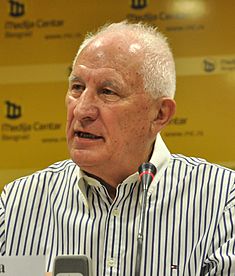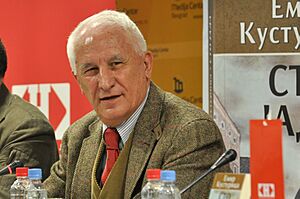Matija Bećković facts for kids
Quick facts for kids
Matija Bećković
OSS
|
|
|---|---|

Bećković in 2015
|
|
| Native name |
Матија Бећковић
|
| Born | 29 November 1939 Senta, Kingdom of Yugoslavia |
| Occupation | Writer, poet |
| Nationality | Serbian |
| Education | Valjevo Gymnasium |
| Alma mater | University of Belgrade Faculty of Philology |
| Notable works | Ćeraćemo se još |
| Spouse |
Vera Pavladoljska
(m. 1964; |
Matija Bećković (born November 29, 1939) is a famous Serbian poet and writer. He is also a member of the Serbian Academy of Sciences and Arts, which is a very important group of smart people in Serbia. He is known for his unique way of writing poetry.
Contents
Life of Matija Bećković
Bećković was born in Senta, a town in the region of Vojvodina. At that time, Senta was part of the Kingdom of Yugoslavia. His family came from Montenegro and had a military background. His father, Vuk, was an officer in the Royal Yugoslav Army. Sadly, his father passed away in 1945.
Early Education and First Poems
Matija finished high school at the Valjevo Gymnasium in Valjevo in 1958. While he was in high school, he published his very first poem. It appeared in a journal called 'Mlada Kultura'. During his time in Valjevo, he also met Vera Pavladoljska. He later dedicated a poem to her, which was published in 1960. Matija and Vera got married and stayed together until her passing.
University and Career
After high school, Matija went to the University of Belgrade. He studied Yugoslav and world literature there. He became a member of the Serbian Academy of Sciences and Arts in 1983. This means he was recognized as a very important scholar and artist. He became a full member in 1991.
Matija Bećković has lived in Belgrade, the capital of Serbia, since 1960. He is a close friend of Vojislav Koštunica, who was a former Prime Minister of Serbia. Bećković also supported Koštunica's political party. In 2006, when Montenegro voted to become an independent country, Bećković spoke against it. He believed Montenegro should remain united with Serbia. In April 2022, he signed a petition. This petition asked Serbia not to place sanctions on Russia. His collected writings were published in 15 books by Matica srpska in 2024.
Poetic Style
Matija Bećković's poetry has a special style. He often uses old Serbian words and phrases from specific regions. This makes his poems sound very unique and connected to Serbian culture. Sometimes, when his poems are translated into other languages, this special regional feeling can be lost.
Awards and Recognitions
Matija Bećković has received many important awards for his writing. These awards show how much his work is valued.
- Grand Cross of the Order of the White Eagle, 2007
- Order of Saint Sava
- Order of Marko Daković
- Radoje Domanović Award
- Marko Miljanov Award, Montenegro
- Milan Rakić Award
- Desanka Maksimović Award
- Njegoš's Award
- Marko Miljanov Award, Montenegro
- Felix Romuliana Award
- Honorary citizen of Subotica
- October Award
- 7 July Award
- Prosveta Award
- Duško Trifunović Award
- Vinaver's wreath
- Velika povelja Brankovog kola
Works
Here are some of the books and poems written by Matija Bećković:
- Vera Pavladoljska
- Metak Lutalica
- Tako je govorio Matija
- Dr. Janez Paćuka o međuvremenu
- O međuvremenu
- ČE: Tragedija koja traje (Also known in English as CHE: Permanent Tragedy)
- Reče mi jedan čoek
- Međa Vuka Manitoga
- Lele i kuku
- Dva sveta
- Poeme
- Služba Svetom Savi
- O Njegošu
- Kaža
- Čiji si ti Mali?
- Nadkokot
- Služba
- Sabrane pesme
- Kosovo najskuplja srpska reč
- Ćeraćemo se još
- Kad budem mlađi (Also known in English as: When I'm Younger)
- Misli
- Bez niđe nikoga
- Put kojeg nema
- Služba pustinjaku cetinskom
- Besede
- Tri poeme
- Prahu oca poezije
- Sto mojih portreta
- Mojih 80
- Crna Gora - ime jedne vere


